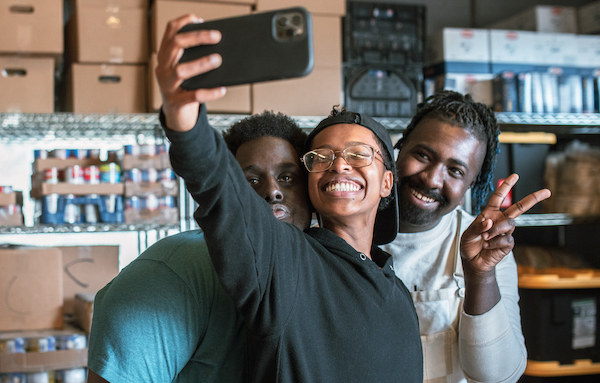5 tips to find a living kidney or liver donor
April 14, 2022

It can be hard to ask for help, even in times of great need. We worry about being rejected, relinquishing control, or showing vulnerability. It’s just human nature.
So, imagine asking someone to donate a piece of themselves, literally, to help you. It takes a special kind of courage for patients in need of a transplant to ask friends, family, or the universe at large to donate a kidney or part of their liver to save their life.
But once they take that leap of faith and make The Big Ask, patients are often surprised by how many of their family members, friends, and even strangers are willing to consider the gift of living organ donation.
Many people are familiar with living kidney donation – when a person with two healthy kidneys donates one for transplantation. Fewer have heard of living liver donation. The liver is the only human organ that can regenerate – a donor can donate more than half of their liver, and it will regrow within a few months.
Living donation can spare patients with kidney or liver failure from years of waiting on the transplant list and help them avoid complex treatment such as dialysis. As such, living donation is becoming more common – more than 6,500 living donor transplants were performed in 2021, an increase of 14.2% over the year before.
Each of these lifesaving procedures started with a vulnerable conversation.
Our Living-Donor Kidney and Liver Transplant Program teams have gathered key insights for how to start searching for a living donor and how to initiate your conversations. Along the way, we provide the education, assessments, and support you and your donor need to make comfortable and informed decisions about the transplant process.
RELATED READING: Arlington principal donates kidney to student's father
1. Find your champion(s)
Along with the emotional strain of searching for a donor, physical challenges related to kidney or liver failure such as fatigue, weakness, or nausea can make it difficult to search on your own.
This is where a living donor champion comes in. A spouse, sibling, or close friend can act as your “cheerleader” to help spread the word so you can focus more on your health.
Our transplant team can empower your champion by helping them anticipate and understand the questions to expect from potential donors, such as:
- Will I have to pay for the organ/tissue removal procedure? (No.)
- How much time will I be off work? (Typically, two to four weeks.)
- Will I be at risk for health problems later? (No more than the average person.)
And we will coach the champion on when to seek our guidance, and how to connect potential donors with us to start the assessment process through our online living kidney donor application or our consultation-based living liver donor process.
Your champion will play a key role in what many patients consider to be one of the toughest parts of the living donor search: talking about your condition and debunking some of the myths about living donor transplant.
You could begin a conversation like this: “Some of you may not know that I’ve been having issues with my health. My kidney is failing, and I need a transplant. The wait for a transplant can be as little as three years but as long as five or more. A living donor is a better option..."
2. Start telling your story
If you’re nervous about discussing your situation, start with your inner circle. Invite close friends and/or loved ones over for a meal. You could also set up a video chat, particularly if your family doesn’t live nearby.
You could begin a conversation like this:
“Some of you may not know that I’ve been having issues with my health. My kidney is failing, and I need a transplant. The wait for a transplant can be as little as three years but as long as five or more. A living donor is a better option as it results in a shorter wait time and better long-term kidney function, and I’d love to have your support as I begin searching for a donor.”
From there, you and your living donor champion can answer questions, allay your loved ones’ concerns and empower them to share your story with their networks to expand your search.
3. Share your story far and wide – safely
Technology and digital media make it easier to share your story as far and wide as you wish. Traditional methods have also proven effective in reaching people in your local community. Here are a few examples of how you can reach potential living donors:
- Ask your house of worship or employer to include your story in their newsletter.
- Create cool T-shirts, stickers, or custom car decals to spread the word.
- Contact local media to see if they will highlight your story.
- Create a personalized website or social media page on Facebook, Instagram, YouTube, TikTok, or Twitter. Here are a couple of examples: That Girl Needs a Kidney. Miracle for Maddie.
- Using hashtags and terms associated with living donation can increase attention to your social media posts. Examples: #KidneyTransplant; #BeADonor; #LivingDonor; #DonateLife.
- Hand out business cards with living donor information – we have some you can use!
- Send a letter or email to friends, family, and co-workers telling them about your situation. Tell your story with photos, videos, humor, and heart.
- Think outside the box, like this man who created a banner to hold up while at a Chicago Bears football game and ended up having his message broadcast nationwide.

As you share your story, be mindful of doing so safely and legally. For example, it is illegal to give money or other items of value in exchange for a donated organ. And it isn’t always wise to provide your personal health information or contact information to people you don’t know.
Our transplant team can offer recommendations for how to share your health information safely. We can talk with you about what expenses might be covered by insurers and resources to potentially cover travel and lodging for the living donor.
Individuals who hear about your story can complete our online living kidney donor application at utswlivingdonor.org or consult with one of our kidney or liver transplant experts. Anyone can apply and our medical team will evaluate each application carefully. Let interested people know their application is confidential, and that applying doesn’t mean they have to donate.
Even if someone can’t donate or is not comfortable applying, they may be willing to share your story with their network.
4. Don't discourage loved ones from applying
It’s common for patients to say they don’t want their adult child, spouse, or parent to donate a kidney or portion of their liver. Remember that kidney and liver diseases also affect your loved ones. If a friend or family member offers to donate, it’s because your life is important to them and they want to see you healthy.
If a loved one wants to donate but has a different blood type, consider trying for paired donation: Our Living Donor Transplant Program team can search our database to potentially match the two of you with another donor/recipient pair who is in the same boat – by swapping donors, both patients still could benefit and both donors still could help save a life.
5. Take care of your mental health
Finding a living donor could be a lengthy process, with highs and lows. It’s normal to feel discouraged at times. Talking about your emotions through the transplant process can help relieve stress, particularly if you talk with people who understand what you’re going through.
Support groups offer a safe space to connect with people who can empathize with your situation and offer encouraging advice. Every UT Southwestern patient can get a streamlined referral to our transplant psychologist who helps guide patients through the full range of emotions that can arise as you wait for a donor kidney or liver.
Bonus tip: Lean on your transplant team
UT Southwestern’s living donor team understands the physical, emotional, and logistical challenges of navigating this niche area of health care. We will help you make informed decisions about everything from eligibility and surgical risks to long-term health expectations and follow-up requirements.
We can connect you with recipients and living donors to provide first-person perspectives about the nuances of organ donation. We also recommend a few national organizations for information about living donation:
Searching for a living organ donation is a challenge, and giving an organ is a remarkable gift. Don’t let uncomfortable conversations stand in the way of your chance at a healthier future.
To talk with a living organ donation expert, call 214-645-1919 or request an appointment online.
Living donor liver transplant
The surgery is complex, as you'll see in this video, but UT Southwestern has a dedicated team of specialists who are proud to be able to offer this life-saving option to our patients.











